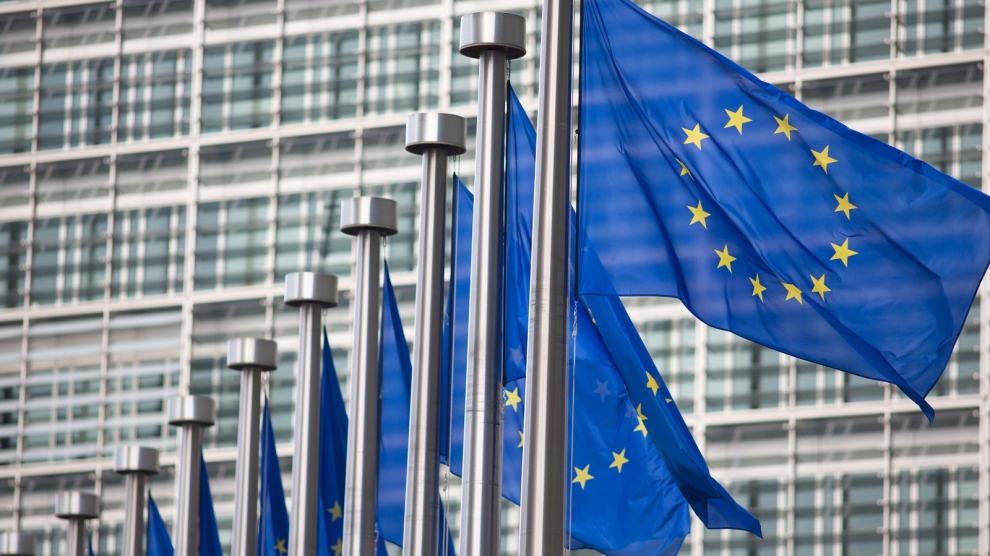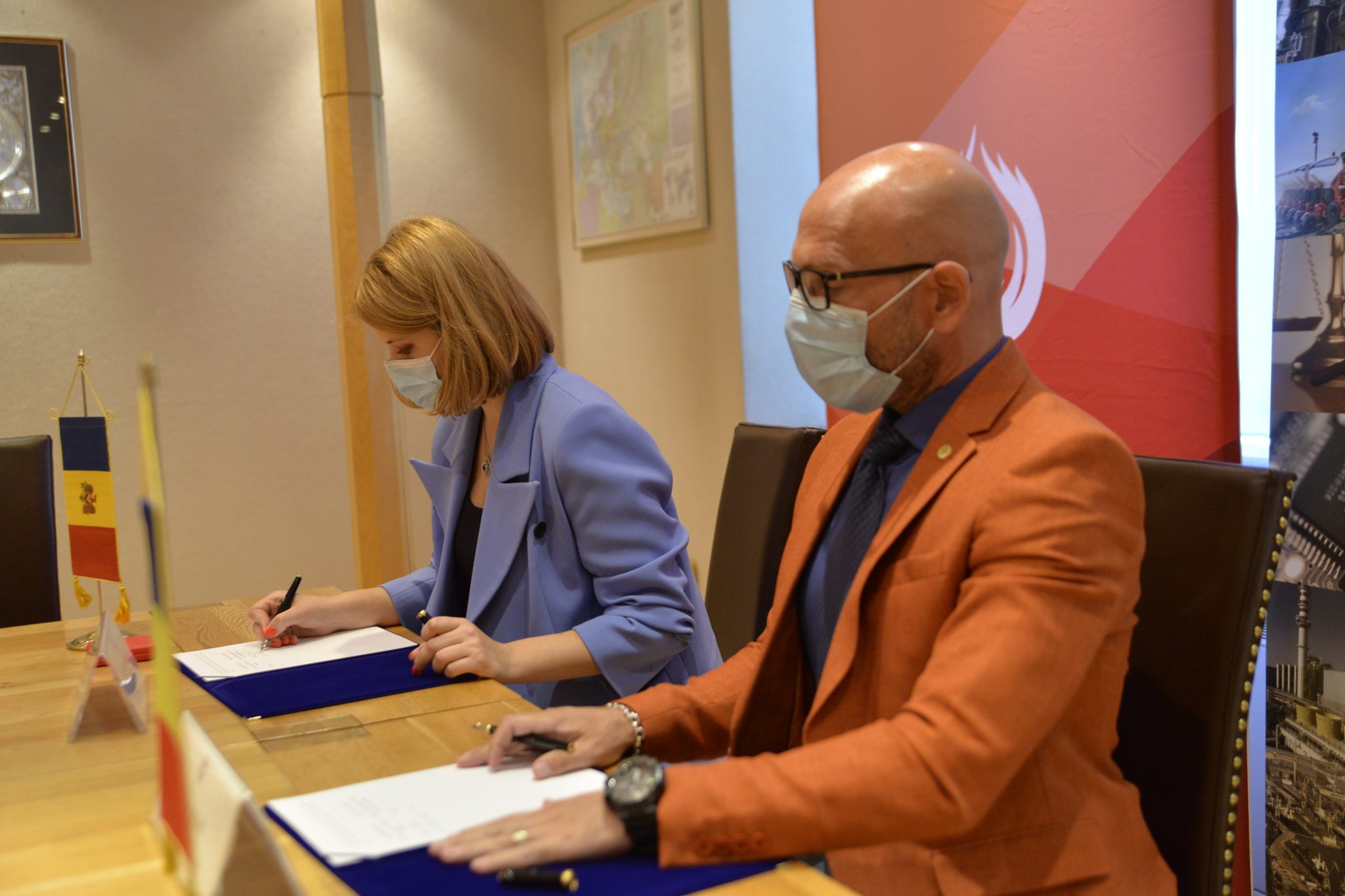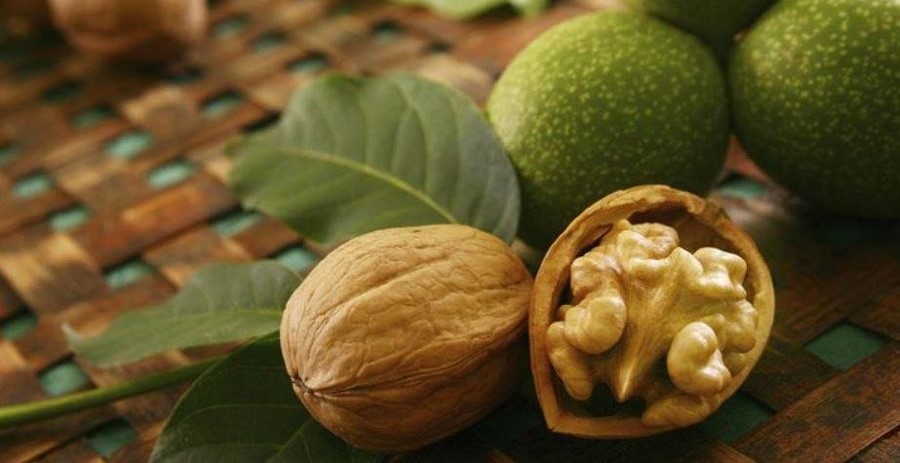Economy
European Commission approves Moldova-EU action plan on visa free regime
Reading Time: 4 minutesPrime Minister Vlad Filat held a news briefing on the results of his visit to Brussels, the governments communications and press relations department has said.
Prime Minister Vlad Filat held a news briefing on the results of his visit to Brussels, the government’s communications and press relations department has said.
The prime minister said that it was a good visit and that he had consistent discussions with European officials. The prime minister emphasized that he made sure once again that there is a great interest in Moldova and that the country has many friends willing to help it advance on the path of democracy and integration into the European Union.
Vlad Filat specified that, at a meeting with European Council President Herman Van Rompuy, he discussed the outcomes achieved by the Moldovan government in 2010, the post-electoral situation in Moldova and emerging prospects.
"I thanked the president of the European Council for the support he has been providing to Moldova in the European integration process. I appreciated a statement made by Herman Van Rompuy concerning the 28 November 2010 parliamentary elections," the prime minister said.
The European official said that the Moldovan government continues to work to fulfill the assumed commitments. Van Rompuy noted that he has a planned visit to Moldova in early 2011.
At a meeting with European Commission President Jose Manuel Barroso, the prime minister discussed the evolutions in Moldova, the latest political events in the country, as well as the actions aiming at driving the country closer to the European Union’s standards.
"A topic to the discussion was the positive dynamic of negotiations on a Moldova-EU association agreement and on the liberalization of the visa regime. I said that we are fully involved in maintaining the same pace at the fifth round of talks on the association agreement, due in Brussels on 17 January 2011. I gave assurances that Moldova will fully turn to account the assistance given by the European Union," Vlad Filat said.
Jose Manuel Barroso congratulated Moldova over the successful holding of the snap parliamentary polls, stressing that the latter took place in line with the democratic norms. The European Commission’s president gave assurances that the European Union will further back Moldova on the European integration path. He urged the Moldovans to continue the European integration process and efficiently implement the reforms started in 2010.
During a meeting with European Commissioner for International Cooperation, Humanitarian Aid and Crisis Response Kristalina Georgieva, the sides focused on the crisis situations faced by the European Union in 2010, the last summer floods in Moldova and the actions that are to be undertaken to efficiently prevent and manage disasters.
"I reviewed the situation in Moldova, underlining the importance to consolidate protection dams, as well as Moldova’s needs of high-tech equipment to manage floods," Vlad Filat said.
Kristalina Georgieva said that, despite the difficult situation in Moldova, the country managed to efficiently respond to the situation caused by the floods. The European commissioner specified that the EC will accept the projects received from Moldova, which is aimed at building capacities of responding to crisis situations. She said that the European Commission will finance projects approved by the Joint Monitoring Committee of the Romania-Ukraine-Moldova Cross-Border Cooperation Programme for 2007-2013 at a meeting in Odessa on 18 November 2010, so as to prevent floods in the Prut river and a project on the improvement of mobile intervention services.
Prime Minister Vlad Filat invited Kristalina Georgieva to pay a visit to Moldova.
At a meeting with EU Commissioner for Enlargement and European Neighbourhood Policy Stefan Fule, Vlad Filat discussed the Moldova-EU cooperation and prospects for its further development.
"The negotiations on the EU association agreement, the dialogue on the visa regime and the creation of a deep free trade zone started in 2010. Also this year, we benefited from Brussels’ unprecedented support for democratic reforms and for Moldova’s European integration. It was a good year for the Moldova-EU ties," the prime minister said.
Vlad Filat said that, in Brussels, he participated in a summit of the European People’s Party. During the event, he exchanged opinions with German Chancellor Angela Merkel, Italian Prime Minister Silvio Berlusconi, Hungarian Prime Minister Viktor Orban, Bulgarian Prime Minister Boiko Borisov and President of the European Parliament Jerzy Buzek. Vlad Filat had discussions with Romanian President Traian Basescu as well.
"I thanked the European officials for the support given to Moldova. I also said that the country will continue the earlier established line of reforms and European integration. The European officials reiterated their backing for Moldova. They emphasized that the development path which Moldova has chosen is correct and needs to be continued. They voiced confidence that the continuation of reforms and the implementation of the European standards will drive Moldova closer to the EU," the prime minister said.
Vlad Filat said that during the visit to Brussels, he participated in public debates organized by the Centre for European Policy Studies, in partnership with the EU-Moldova Forum and the organization, "European Partnership for Democracy."
Also in Brussels, the prime minister signed a 90-million-euro grant agreement with the European Commission. European Commissioner for Economic and Monetary Affairs Olli Rehn signed the agreement on behalf of the European Commission.
The first 40-million-euro-worth installment is to be transferred till 24 December 2010. The second installment, amounting to 50 million euros, will be transferred in 2010. These amounts have been already included in the state budget.
"Beyond its financial meaning, this agreement is also an expression of the friendly attitude and support which the European Union constantly provides to Moldova." Vlad Filat said.
The prime minister added that, on 16 December evening, the European Union approved the EU-Moldova action plan on the liberalization of the visa regime. The document will be handed to Moldova’s authorities by European Commissioner for Internal Affairs Cecilia Malmstrom, who will visit Moldova.
Economy
Moldova will receive a disbursement of 36 million euros as part of the the Economic Recovery Plan

This week, the European Commission approved the disbursement of 36 million euros in grant money for the Republic of Moldova. The announcement was made by Deputy Director-General for Neighbourhood Policy and Enlargement Negotiations at the European Commission, Katarina Mathernova, who paid an official visit to the Republic of Moldova between September 13-15, together with Managing Director for Russia, Eastern Partnership, Central Asia, Regional cooperation and OSCE, at the European External Action Service, Michael Siebert.
The EU officials had meetings with President Maia Sandu, Minister of Foreign Affairs and European Integration, Nicu Popescu, Speaker of Parliament, Igor Grosu, Prime Minister of the country, Natalia Gavrilita, as well as key representatives of Government, international financial institutions and the civil society, according to a press release issued by the Delegation of the European Union to the Republic of Moldova.
Beside such topics as the EU-Moldova relations and prospects, the priorities of the reform agenda of the new Moldovan Government, preparations for the Eastern Partnership Summit at the end of the year and the Transnistrian conflict settlement, the officials also discussed the EU assistance in support of reforms and the Economic Recovery Plan for Moldova, which was announced in June with a total EU support of 600 million euros over the next 3 years.
“The first measures under the Economic Recovery Plan will shortly materialize, with the expected disbursement of 36 million euros in grant money under budget support programmes to support the authorities’ efforts to fight against the consequences of the pandemic. Moldova can count on EU’s assistance on its path to reforms and to recovery, bringing tangible results to citizens,” Katarina Mathernova stated.
The plan is based on assistance provided by the European Union through various bilateral and regional instruments, aiming to mobilize the funds in the form of grants, loans, guarantees and macro-financial assistance.
“The Economic Recovery Plan for the Republic of Moldova involves much more, not just this financial support provided immediately. It must help digital transformation, strengthen infrastructure, energy efficiency, education and support small and medium-sized enterprises,” the EU official also said.
As Prime Minister Natalia Gavrilita informed, “The Economic Recovery Plan and the 5 flagship initiatives for Moldova in the Eastern Partnership will directly contribute to the reform and consolidation of institutions, stimulate long-term socio-economic development, bring direct benefits to citizens, and unleash new economic opportunities through promoting the green agenda and digitization. Small and medium-sized enterprises (SMEs) have been hit hard by the crisis. Promoting and diversifying access to finance and reducing collateral requirements will be essential in supporting economic operators. We are grateful to the EU partners who will launch two programs to support 50 000 independent Moldovan SMEs to adapt to the new conditions.”
President of the Republic of Moldova, Maia Sandu, welcomed the decision of the European Union to disburse about 745 million lei in grant money, as the official page of the President’s Office announced. “EU support comes after a long period of freezing of European assistance, caused by former governments. We managed to relaunch the political dialogue with the European Union and resume financial assistance. The Republic of Moldova is gradually regaining the trust of its strategic partners. This European support is also a signal of encouragement for the new Government team in its commitment to clean up the institutions, fight corruption and launch development programs in the country,” said Maia Sandu.
Photo: unknown
Economy
Romania and Moldova signed a partnership memorandum pledging to cooperate in promoting their wines

The Chamber of Commerce and Industry of Romania (CCIR) and the National Office for Vine and Wine (NOVW) of the Republic of Moldova signed, last week, a memorandum of cooperation on organizing joint promotional activities in the markets of common interest, as the CCIR announced.
China, Japan or the USA are just some of the markets targeted by the Romanian and Moldovan institutions. The memorandum also involves advertising activities for wines from common indigenous varieties, promoting the oeno-tourist region, developing a tourist route in the two states, exchange of experience, study visits, and mutual support in identifying new export opportunities. “We are very confident that this collaboration between our organizations will lead to sustainable economic growth and a higher degree of well-being among Moldovans and Romanians,” claimed Deputy Secretary-General of CCIR, Bogdan Visan.
On the other hand, Director of the NOVW, Cristina Frolov, declared that no open competition with Romania is aimed at the governmental level of the Republic of Moldova. “This request for collaboration is a consequence of the partnership principle. Romania imports 10-12% of the wine it consumes, and we want to take more from this import quota. Every year, the Romanian market grows by approximately 2.8%, as it happened in 2020, and we are interested in taking a maximum share of this percentage of imported wines without entering into direct competition with the Romanian producer,” the Moldovan official said. She also mentioned that Moldova aims at increasing the market share of wine production by at least 50% compared to 2020, and the number of producers present on the Romanian market – by at least 40%.

Source: ccir.ro
**
According to the data of the Romanian National Trade Register Office, the total value of Romania-Moldova trade was 1.7 billion euros at the end of last year and over 805 million euros at the end of May 2021. In July 2021, there were 6 522 companies from the Republic of Moldova in Romania, with a total capital value of 45.9 million euros.
The data of Moldova’s National Office of Vine and Wine showed that, in the first 7 months of 2021, the total quantity of bottled wine was about 27 million litres (registering an increase of 10% as compared to the same period last year), with a value of more than one billion lei, which is 32% more than the same period last year. Moldovan wines were awarded 956 medals at 32 international competitions in 2020.
Photo: ccir.ro
Economy
Moldova’s hope to be a top walnut exporter and its main difficulties

The Republic of Moldova has perfect weather conditions for growing walnut trees, that creating a great potential of walnut production and trade, especially on international markets, where the demand is way higher than the product’s supply. National and international experts believe that the country’s walnut production industry is on the verge of important transformations, which could lead to increased yields, quality and competitiveness worldwide.
According to authorities, Moldova exports 34-35 thousand tons of walnuts in shell, which is about 7% of the total export of fruit and 5% of the total export of horticultural products. The export value is assessed as being $120 million, that being 57-60% of the total fruit export value and about 50% of horticultural export value. Most of walnut crops are exported to the EU countries, such as France, Germany, the Netherlands, Romania and Austria. The country’s exports were among the world’s top 10 when it comes to the highest dollar value of the product during 2020.
Viorel Gherciu, Minister of Agriculture and Food Industry, pointed out that the production in the domestic walnut industry has increased by 55% in the last five years, which ranks Moldova among the main producers in the world.
“The biggest opportunity for this industry is that we are in the geographical proximity of the largest walnut import area in the world, which is the European Union, with almost 40% of total imports in the world. We are on the EU border, with privileged relations, with an Association Agreement. We already enjoy a good relationship in working with European importers, they trust our processors. A very close collaboration has been created and this is, in fact, the guarantee for those who invest in the area,” claimed the president of the Walnut Producers Association, Oleg Tirsina.
The data provided by the National Bureau of Statistics show that there are 34.7 thousand hectares of walnut plantations in the country. 20.90 hectares are represented by orchards. 75% of planted orchards are formed of old varieties trees. 30-35% of the exported production comes from orchards, the rest comes from individual farmers and plantations along the roads. This means that the quality of walnut production is not at its maximum potential. Developing commercial plantations through orchards modernization and extension of walnut varieties would provide double yield and better quality, experts say.
Governmental support in the form of subsidizing solutions, foreign investments and credit options are indispensable for the industry development. One of the financing options is the credit line of the European Investment Bank Project. Since 2016, 15 producers and processors of nuts, almonds and hazelnuts have benefited from these loans with the total amount of investments worth 8.7 million euros. A further extension of the project would provide another 60 million euros for the modernization of the horticultural sector in general and for harvesting organic walnuts in particular.
Photo: heymoldova.com





















